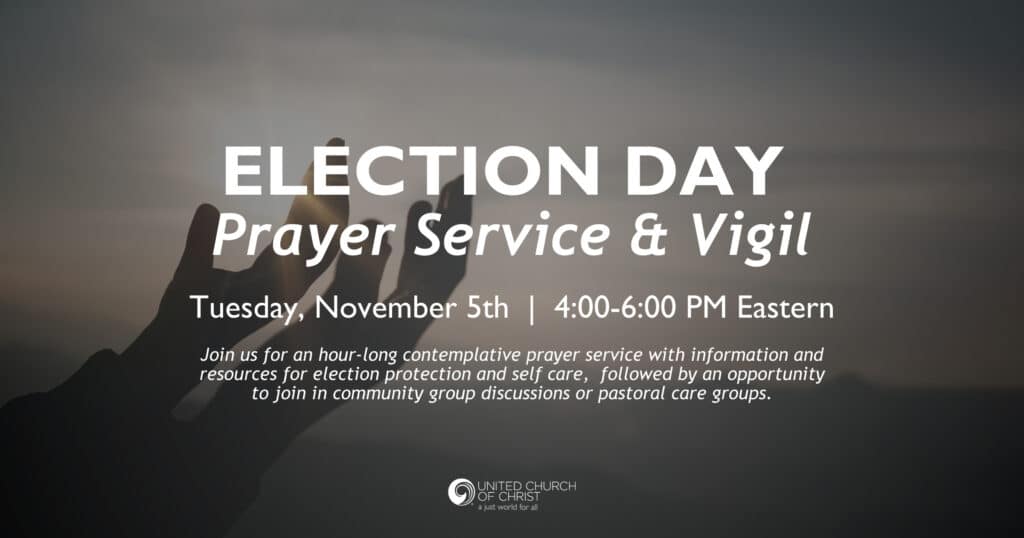UCC joins other U.S. religious groups speaking out against ‘Muslim-free zones’
 A coalition of religious leaders from across the country –– including United Church of Christ General Minister and President the Rev. John C. Dorhauer –– is speaking out against the growing number of businesses and cities in the United States attempting to create “Muslim-free zones.”
A coalition of religious leaders from across the country –– including United Church of Christ General Minister and President the Rev. John C. Dorhauer –– is speaking out against the growing number of businesses and cities in the United States attempting to create “Muslim-free zones.”
In a statement released by Shoulder to Shoulder, an interfaith organization dedicated to ending anti-Muslim sentiment, the leaders declared, “We are deeply disturbed by recent reports that a growing number of businesses across America have declared themselves to be ‘Muslim-free zones,’ the latest of which is a gun range in Oktaha, Oklahoma. … These declarations are anti-American, and they are an affront to all religious groups in America.”
Shoulder to Shoulder, founded in 2010 by more than 20 national religious groups, noted in the statement that the “Muslim-free zones” are “not simply isolated, singular incidents that target American Muslims,” but are only the latest in an “ever-growing wave of anti-Muslim discrimination across the country.”
“From local zoning boards trying to block the building of mosques, to city councils and state legislatures using anti-foreign law measures to denigrate local Muslim communities, there has been a campaign to close our communities to American Muslims,” the statement reads. “The recently organized opposition to the construction of a Muslim cemetery by residents of Farmersville, Texas, highlights the trend of people in towns and cities across the country expressing opposition to treating American Muslims as full and respected citizens of this nation.”
“The United Church of Christ continues to support the efforts of the Shoulder to Shoulder campaign in addressing and monitoring incidents of Islamaphobia across the U.S. These latest acts of discrimination are disturbing and threaten the religious freedom of Muslims in these United States,” said the Rev. Karen Georgia Thompson, the UCC’s minister for ecumenical and interfaith relations and a member of the Shoulder to Shoulder steering committee. “The voices of the religious community unite to oppose these acts of discrimination and to stand together with our Muslim sisters and brothers to ensure their right to practice their faith.”
In addition to Dorhauer, the statement is signed by leaders of the United Methodist Church, the Evangelical Lutheran Church in America, the American Baptist Churches USA, the Presbyterian Church (USA), the Christian Reformed Church in America, Christian Church (Disciples of Christ), the Union for Reform Judaism, the Unitarian Universalist Association, the Islamic Society of North America, the Interfaith Alliance, and the National Council of Churches, among others.
The statement reiterates that businesses and communities banning any particular identity group is a form of blatant discrimination that “is in violation of U.S. law, encoded in the Civil Rights Act of 1964.”
“We are committed to our core religious values of welcoming the stranger and treating people of another background as we ourselves would want to be treated. We hope all Americans will join with us in rejecting efforts to wrongly scapegoat American Muslims, or Americans of any faith, ethnicity or identity,” the statement adds.
“If we allow discrimination against a particular religious group to take root, we are opening the door for all religious communities to become the next targets. We must therefore work collectively to uphold the equal rights for all religious communities in this country, if we are to protect the freedoms sacred to us all.”
Related News
UCC to offer Election Day Prayer Service and Vigil
On Election Day, Nov. 5, join the Rev. Karen Georgia A. Thompson together with United Church...
Read MoreGoing beyond the blessing: Churches emulate St. Francis’ care for animals
https://www.youtube.com/watch?v=lu3LYwhLxCo UCC News presents a video news story on the...
Read MoreUCC leaders invite all to global celebration of Reformation Sunday
This Reformation Sunday, leaders from the United Church of Christ will participate in a global...
Read More


